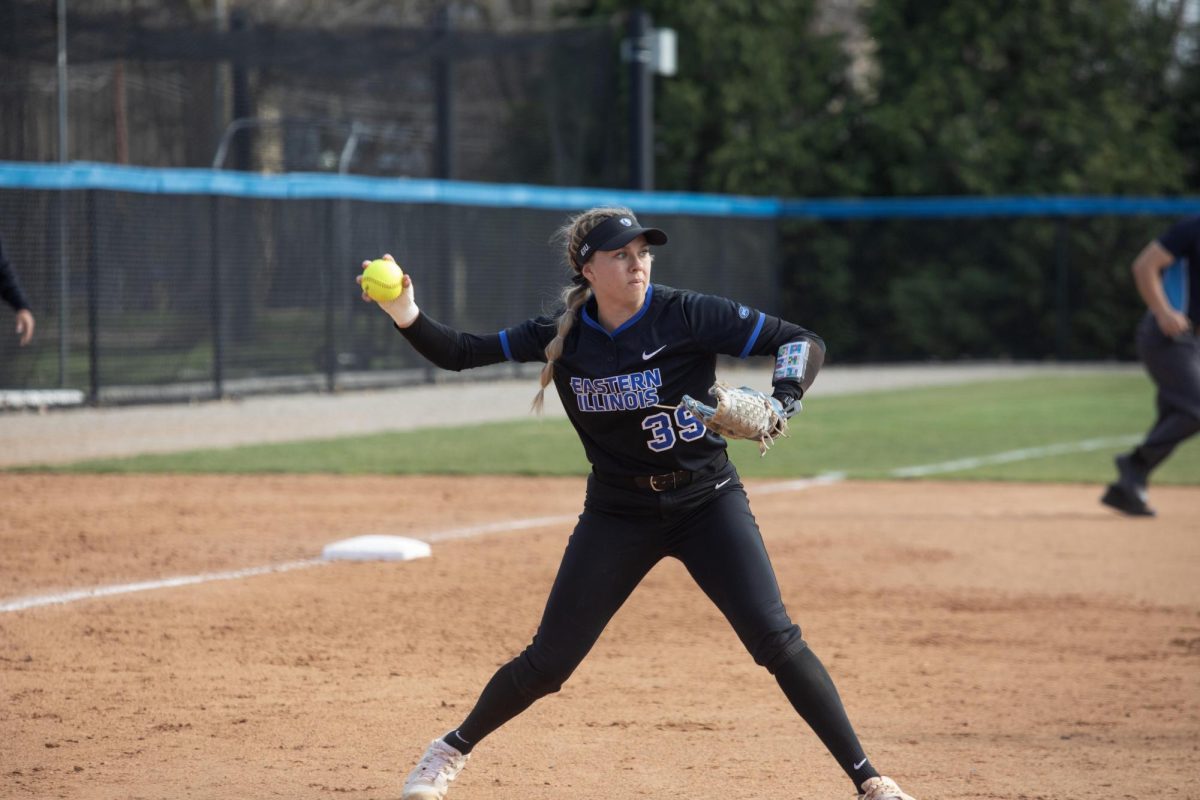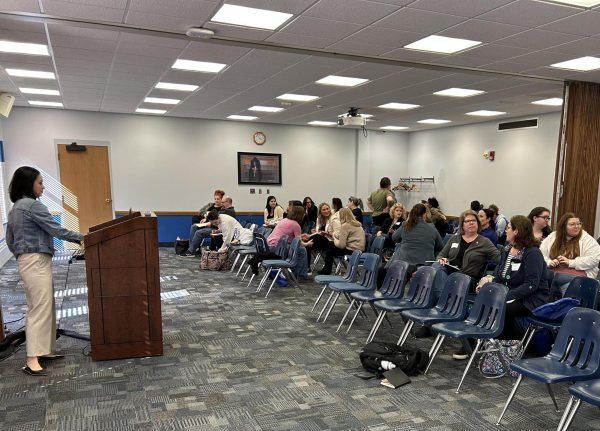Eastern alumn speaks about Geographical Awareness Week
Golden Era of Geography, is it or is it not? That was the question addressed by Eastern alum Andrew Baker during his lecture for Geography Awareness Week on Thursday in the Physical Science Building.
Baker believes we are living in the golden era of geography because of all of our technological advances that allow us to graph better maps and ultimately learn more about people.
He opened up his lecture with a YouTube video featuring Miss Teen South Carolina answering a question about geography. Her answer for why most Americans are geographically uninformed was because of a lack of maps.
Michael Cornebise, associate professor of geography, introduced Baker and considered the video a good example of why Geographical Awareness Week is so important.
“I think it (the video) is funny,” Cornebise said, “You saw in tonight’s presentation someone who had very little knowledge about geography portrayed in the YouTube video and this is our way of showing that there’s still a kind of a big gap between people’s geographic knowledge and where we need to be.”
During his lecture, Baker discussed how new technology allows us to learn about human behavior based on their environmental surroundings.
“Global Positioning Software (GPS) is becoming so accessible but also so small,” Baker said. “One of the things with technology is helping to make those devises smaller so we can attach those suckers to a whole lot of different stuff and also understand and learn more about human behavior, animal behavior and so forth.”
This new technology includes GPS devises being placed in shoes, jackets, and even asthma inhalers.
“They’re actually attaching a GPS to an asthma inhaler,” Baker said. “It’s not so much that if you lose your inhaler you can know where it is, instead what we’re trying to do is understand human behavior. One of the things is every time you have an asthma attack, you pull out that inhaler and so what they’re trying to do is understand the environmental characteristics that create or make it likely to have an asthma attack.”
Geography Awareness Week, which began in 1987, was founded by the National Geographic Society to promote geographic knowledge and awareness. Cornebise believes this week is important because it helps everyone become more involved with the topic and how it influences society.
“Well, it’s very important,” Cornebise said. “The nice thing about it was we’ve been celebrating it now for 22 years. It was signed into law by Ronald Reagan.
“I think the week will help bring people up to speed and as a matter of fact you can go online to National Geographic and they have a website specifically for Geographical Awareness Week and they’ve got activities for kids and adults and a lot of data.”
Baker, who describes himself as a human geographer, discussed the importance of geography in people’s daily lives and how geography is a good field for students to get into. He showed a slide listing all the jobs he has been offered this year and encouraged students to get involved in geography and possibly teaching.
“A lot of the jobs up there were teaching jobs and let me tell you, ain’t a bad gig at all,” Baker said. “It may not pay well but it’s a pretty damn good lifestyle.”
Post secondary teaching was listed on his slide eight of the 10 most in demand jobs for Indiana.
Baker has been teaching at Purdue, IUPUI for over a year and also works as a lecturer for human geography.
Danae Purtz, family consumer science major, enjoyed Baker’s lecture.
“I didn’t know much about this field and basically came for extra credit, but it was really interesting to hear what he had to say,” Purtz said.
Megan Tkacy can be reached at 581-7943 or at DENNewsdesk@gmail.com.











![[Thumbnail Edition] Junior right-handed Pitcher Lukas Touma catches at the game against Bradley University Tuesday](https://www.dailyeasternnews.com/wp-content/uploads/2025/03/MBSN_14_O-e1743293284377-1200x670.jpg)

![[Thumbnail Edition] Eastern Illinois University baseball senior utility player Tyler Castro fields a ground ball during the team's first intrasquad scrimmage of the season on Jan. 31.](https://www.dailyeasternnews.com/wp-content/uploads/2025/03/BB_01_O-e1742874760130-1-e1742907504722-1200x911.jpg)
![[Thumbnail Edition] Senior Foward Macy McGlone, getsw the ball and gets the point during the first half of the game aginst Western Illinois University,, Eastern Illinois University Lost to Western Illinois University Thursday March 6 20205, 78-75 EIU lost making it the end of their season](https://www.dailyeasternnews.com/wp-content/uploads/2025/03/WBB_OVC_03_O-1-e1743361637111-1200x614.jpg)





































![The Weeklings lead guitarist John Merjave [Left] and guitarist Bob Burger [Right] perform "I Am the Walrus" at The Weeklings Beatles Bash concert in the Dvorak Concert Hall on Saturday.](https://www.dailyeasternnews.com/wp-content/uploads/2025/03/WL_01_O-1200x900.jpg)
![The team listens as its captain Patience Cox [Number 25] lectures to them about what's appropriate to talk about through practice during "The Wolves" on Thursday, March 6, in the Black Box Theatre in the Doudna Fine Arts Center in Charleston, Ill.](https://www.dailyeasternnews.com/wp-content/uploads/2025/03/WolvesPre-12-1200x800.jpg)



















